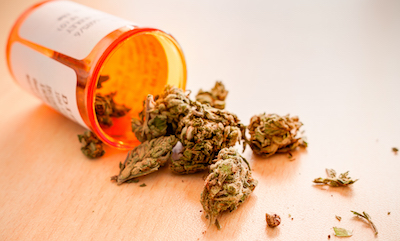Cannabis Is Not Solution to Opioid Crisis.
 Opioid addiction is now a qualifying condition for medical marijuana in New York, Pennsylvania, and New Jersey. The majority of states already approve cannabis as an alternative to opioids for managing chronic pain. But the evidence for cannabis as an effective pain management tool is limited—and research suggests using cannabis for opioid addiction treatment may be harmful, according to a new viewpoint co-authored by a School of Public Health researcher.
Opioid addiction is now a qualifying condition for medical marijuana in New York, Pennsylvania, and New Jersey. The majority of states already approve cannabis as an alternative to opioids for managing chronic pain. But the evidence for cannabis as an effective pain management tool is limited—and research suggests using cannabis for opioid addiction treatment may be harmful, according to a new viewpoint co-authored by a School of Public Health researcher.
“If cannabis is recommended medicine, it should be held to medical standards,” wrote Richard Saitz, professor of community health sciences, and Keith Humphreys of the Veterans Affairs Health Services Research and Development Center at Stanford University, in JAMA.
“Cannabis and cannabis-derived medications merit further research, and such scientific work will likely yield useful results,” they wrote. “This does not mean that medical cannabis recommendations should be made without the evidence base demanded for other treatments.”
There is some evidence for cannabis alleviating neuropathic pain, Saitz and Humphreys explained, but that evidence is weak, and there is insufficient evidence for other types of pain. When it comes to substituting cannabis for opioids for pain management or even using cannabis to treat opioid addiction, they wrote, the evidence is even weaker.
So far, the evidence in support of replacing opioids with cannabis is based on patient surveys, and on reports that states with legalized medical marijuana have fewer opioid overdose deaths than expected. But “correlation is not causation,” Saitz and Humphreys wrote, explaining that these reports do not account for other differences between states, such as Good Samaritan laws, incarceration practices, and the availability of evidence-based addiction treatment and naloxone.
The largest prospective study of cannabis as a substitute for opioids followed a cohort of 1,514 patients with chronic pain who had been prescribed opioids. In that study, researchers saw more subsequent pain in the patients who used cannabis—and no reductions in prescription opioid use. “There was no substitution,” Saitz and Humphreys wrote. “Rather, cannabis was simply added to the mix of addictive substances taken by patients with pain.”
Research has also pointed to the potential dangers of prescribing cannabis to treat opioid use disorder. “To date, no prospective evidence, either from clinical trials or observational studies, has demonstrated any benefit of treating patients who have opioid addiction with cannabis,” Saitz and Humphreys wrote.
The only individual-level analysis, which used a nationally-representative sample of 57,146 people, found medical cannabis use was associated with more use and misuse of prescription opioids, they wrote.
That anyone would suggest an unproven treatment when proven ones exist “reflects the fact that people with opioid addiction are stigmatized,” Saitz and Humphreys argued. “No comparable provision has been made for other chronic diseases.”
Instead of looking to as-yet unproven medical marijuana to fix the opioid crisis, they argued for the treatments and efforts that are proven, but underutilized. Methadone and buprenorphine are proven treatments for opioid use disorder but are underprescribed, they wrote, while previous research has shown several nonopioid painkillers and non-medication treatments are effective.
Until there is convincing evidence that cannabis can replace opioids for chronic pain and even treat opioid use disorder, Saitz and Humphreys wrote, encouraging patients to use cannabis instead of proven treatments “would be irresponsible.”